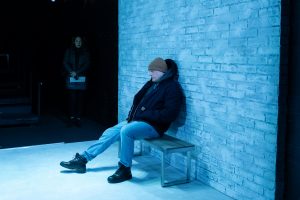 The setting is a winter day in a small Ohio town. The time is the present. In Scott Organ’s new play, a question lingers. Where did the time go? 17 Minutes reflects on an America that has tragically accepted a new normal. There has been a school shooting. Again. Another larger question? Who is to blame?
The setting is a winter day in a small Ohio town. The time is the present. In Scott Organ’s new play, a question lingers. Where did the time go? 17 Minutes reflects on an America that has tragically accepted a new normal. There has been a school shooting. Again. Another larger question? Who is to blame?
Virgil Morris (Brian Rojas), a plain clothes detective, is interviewing Sheriff’s Deputy Andy Rubens (Larry Mitchell). How much do you know? Andy is not sure what has happened since “you guys whisked me away so fast.” This earnest protector has been working at this school for years. A diligent lawman, he locks his gun in a safe every evening. He only has one key. His gun is regularly cleaned. Every single day he checks the clip to make sure it is functioning.
On this particular day, he is standing outside by a door when he hears three bursts from an automatic rifle. Then he hears three more bursts. The time is 8:11 and students are in the building. He radios in the emergency. “There’s a shooter,” he says, and “I’m going in the south doors.” Andy never goes through the door. “The SWAT guys pulled me out of there before I got the chance.”
This interview is tense and concerning. Andy does not yet know there are fatalities. A serviceman who served in Iraq, he is well-trained for combat. From the time of the call to the eye contact made with the SWAT team, seventeen minutes have passed. What happened during that time? Andy was assessing the situation. Meanwhile, America’s new normal was in progress.
In a series of seven scenes which take place over a two month period, we observe the impact of these seventeen minutes. The blur that Andy experienced. His wife Samantha (DeAnna Lenhart) worries about him, their life and their future. Harassing phone calls. The threat of losing a job and a pension. What happened during those seventeen minutes?
Andy meets with his partner Mary (Shannon Patterson). She was also at the school that day. Andy couldn’t tell where the shots were coming from. Was it like Las Vegas? From the roof? What did Mary do, he asks. She ran toward the sounds. She disarmed the child and became a reluctant hero. In other words, she did the job a school paid her to do.
17 Minutes gets behind the scenes of these stories to consider the aftermath of horrific events. What does the father of the shooter respond when asked, “Why do you still live here?” Michael Giese plays the role no one can imagine having to endure. “Is there anything in this life I could have done differently? That day? And the answer is, of course, yes.”
The play’s finest scene takes place while a memorial is being held. Cecilia (Lee Brock) is pissed and wrecked. She asks the questions we all do. Her proximity and personal trauma, however, is much more raw than the rest of us. Who is to blame? The school system? The shooter? The parents? The government? The founding fathers? Andy?
Seth Barrish’s direction is nicely paced to allow the contemplative nature of this play emerge. The poignancy feels real. How do we all come to terms with these commonplace American occurrences? “How could there be meaning in one child gunning down dozens of kids?”
Scott Organ’s 17 Minutes is well-staged and performed. Larry Mitchell effectively plays Andy as an everyman and a nobody. We are asked to put ourselves in his shoes. They are uncomfortable. Ms. Patterson and Ms. Brock shine in their portrayals of Andy’s partner and Cecilia, a mom. There is a fortress of strength in these women that is admirable. Behind the gates, there is also heartbreaking reality and exhausting resignation. That’s completely recognizable as our America today. 17 Minutes is a fine addition to our national dialogue about our country’s abject failure of courage.
17 Minutes is running at The Barrow Group until February 15, 2020.
